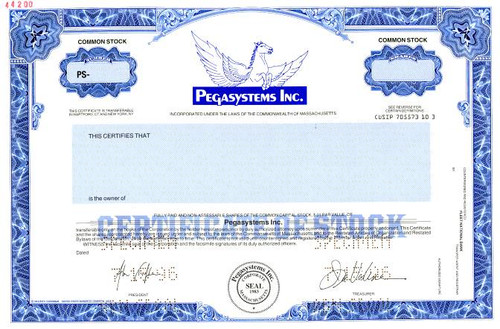Beautifully engraved specimen certificate from Stowe-Woodward, Inc. This historic document was printed by the John Lowell Banknote Company and has an ornate border around it with a vignette of an eagle. This item has the printed signatures of the Company's President, and Treasurer. 
Certificate Vignette Stowe Woodward began processing rubber and polymer in 1886, and has been at the forefront of the industry since then. As early as 1910 Stowe Woodward was improving the productivity in textile and tannery operations with rubber covers that increased the service life of steel rolls. By 1945, the Newton, Massachusetts, plant was meeting the growing demands of the paper industry by engineering and supplying long-lasting rubber covers for the larger paper making machines. During the 1950s and '60s, Stowe Woodward kept pace with new technologies and increased demand by adding new facilities in Griffin, Georgia; Neenah, Wisconsin; Sandusky, Ohio; Ruston, Louisiana; and Kelso, Washington. Most of these facilities are still in use today. New plants and international licensing arrangements also delivered Stowe Woodward's products and expertise throughout Europe. In the 1970s and '80s Stowe Woodward engineers increased industry productivity with innovations such as Dri-Press engineered nips for more efficient dewatering and Comput-A-Cover technology for more accurate application of roll covers. Stowe Woodward added the durability and performance capabilities of polyurethane with the acquisition of Essex Polymer in 1973. New developments in polyurethane technologies led to additional production facilities in Sherbrooke, Canada, and Middletown, Virginia. In the 1990s, Stowe Woodward introduced the PressManager press section management tool, PRAXAIR ceramics cover technology, and SMART roll embedded monitoring technology. In the new millennium, Stowe Woodward added nanotechnology to its composite roll covers for increased surface quality and durability, and continued the trend by introducing stabilizer-reinforced belts for the shoe press. History from Encyberpedia and OldCompany.com (old stock certificate research service)
About Specimen Certificates Specimen Certificates are actual certificates that have never been issued. They were usually kept by the printers in their permanent archives as their only example of a particular certificate. Sometimes you will see a hand stamp on the certificate that says "Do not remove from file". Specimens were also used to show prospective clients different types of certificate designs that were available. Specimen certificates are usually much scarcer than issued certificates. In fact, many times they are the only way to get a certificate for a particular company because the issued certificates were redeemed and destroyed. In a few instances, Specimen certificates were made for a company but were never used because a different design was chosen by the company. These certificates are normally stamped "Specimen" or they have small holes spelling the word specimen. Most of the time they don't have a serial number, or they have a serial number of 00000. This is an exciting sector of the hobby that has grown in popularity over the past several years.

Certificate Vignette
About Specimen Certificates Specimen Certificates are actual certificates that have never been issued. They were usually kept by the printers in their permanent archives as their only example of a particular certificate. Sometimes you will see a hand stamp on the certificate that says "Do not remove from file". Specimens were also used to show prospective clients different types of certificate designs that were available. Specimen certificates are usually much scarcer than issued certificates. In fact, many times they are the only way to get a certificate for a particular company because the issued certificates were redeemed and destroyed. In a few instances, Specimen certificates were made for a company but were never used because a different design was chosen by the company. These certificates are normally stamped "Specimen" or they have small holes spelling the word specimen. Most of the time they don't have a serial number, or they have a serial number of 00000. This is an exciting sector of the hobby that has grown in popularity over the past several years.








